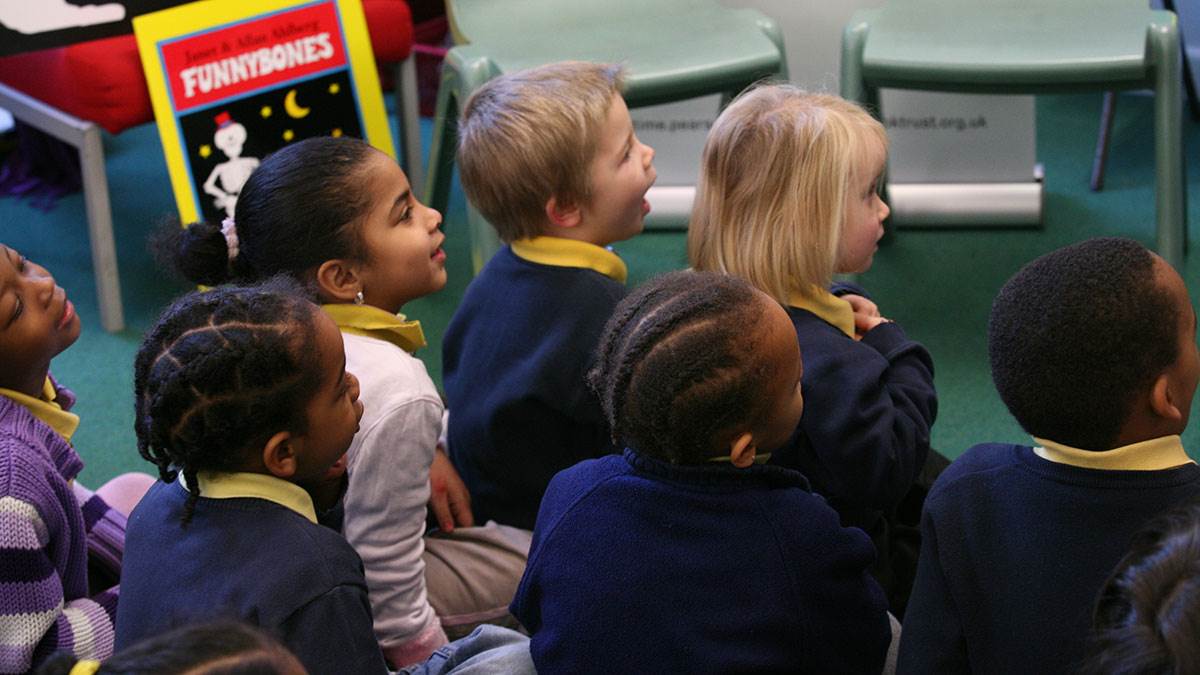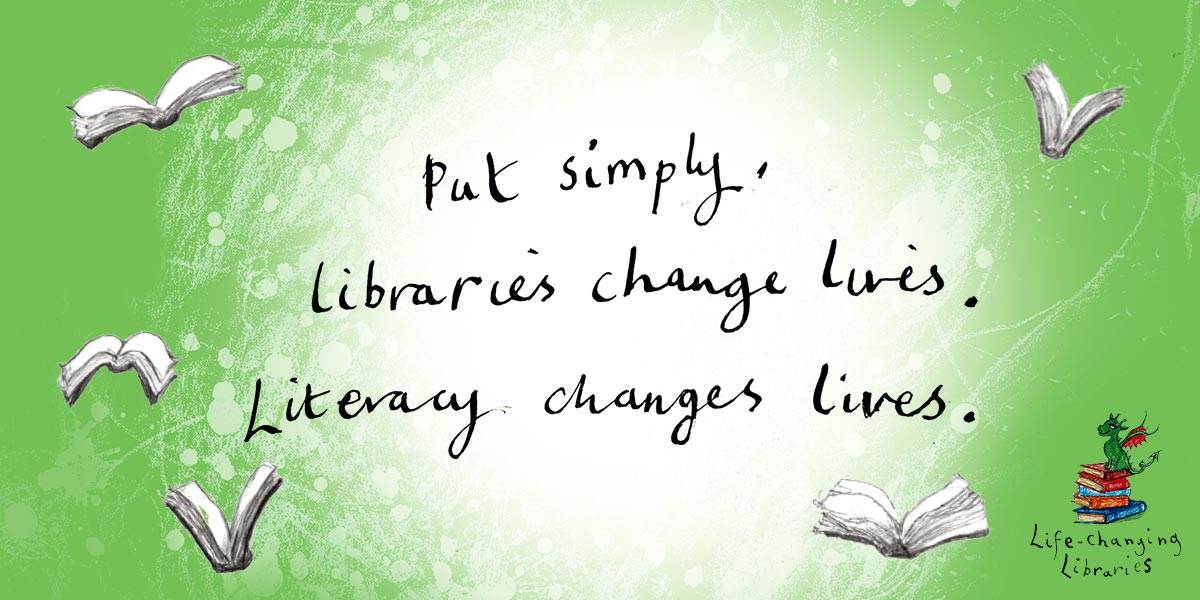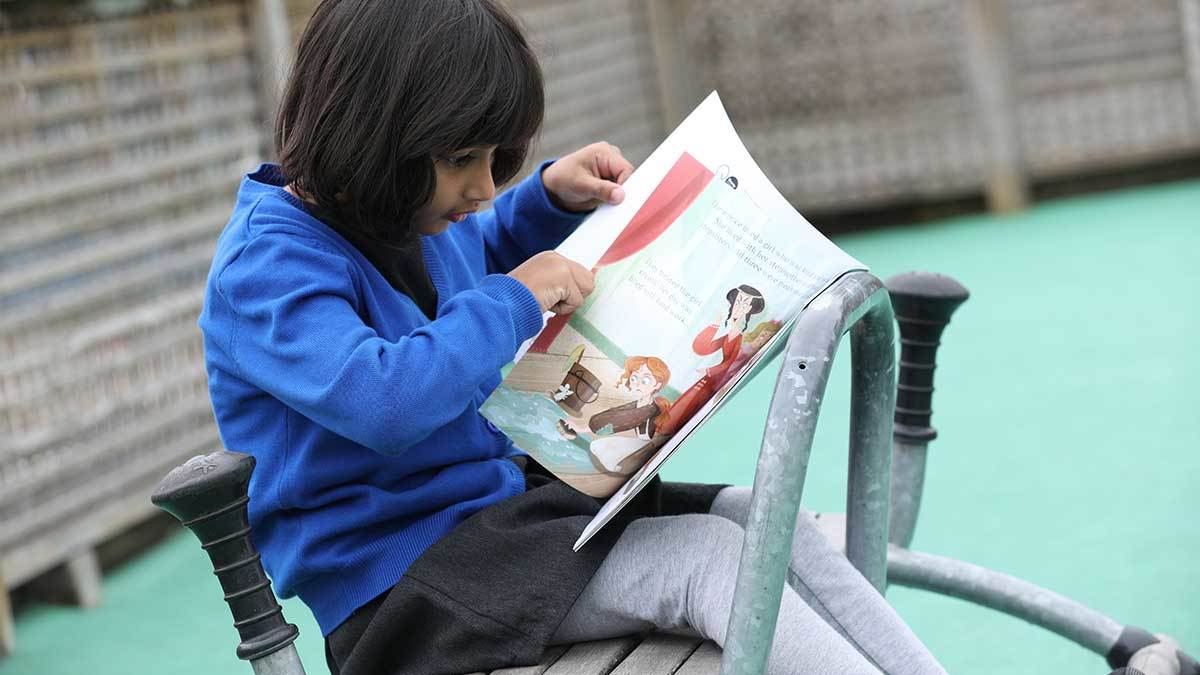Ten tips for creating an unforgettable school library
Published on: 26 April 2021
As part of Cressida Cowell's Life-changing Libraries project, we're supporting six primary schools across the country to transform their libraries into amazing spaces that encourage a lifelong love of reading. Here are ten tips for creating an unforgettable school library, from Alison Tarrant at the School Library Association.

Less is more – sometimes
It is a game changer to have books on display, facing outwards, open, ready to catch the eye of children walking past. In order to do this you will have to be brutal with your collection management and this means getting rid of old books, tired books, books which are past their best. You don’t want the shelves crammed full; less really is more.
Children won’t search through shelves of dog-eared, unattractive books unless they really want something – as Cressida said, it should be like a sweet shop with goodies catching their eye.
Give someone responsibility… and time
Having someone responsible for the library, who will get involved and keep it running with love and enthusiasm, ignites the engine of your reading culture. We can all appreciate it’s nice to sit in an old-style railway carriage, but it’s even better if you’re going somewhere, if you can see the scenery whizzing by, smell the smoke from the engine and hear the horn blast. This is the difference a member of school library staff can make. Appoint someone who understands what a difference a school library can make and who will prove it – not someone who wants to sit behind a desk!
Library lessons
Having time in the library is vital. This provides not only time to explore the library, to borrow, renew and return books, but time to learn how to browse and select books, how to understand the systems, how to read and discuss and debate. Some schools are reluctant to hold them as they feel a whole lesson of ‘just’ reading can be a bit much, or because it’s not apparent that reading is happening rather than ‘turning pages’.
Split the lesson into choosing, reading and activities – if the activities relate to the reading just done it’ll soon be apparent who’s reading and who isn’t, and it also enriches everyone’s understanding and exposure to books. This way, all children are given the same opportunity and encouragement - not just those who have picked up reading skills earlier than their classmates.

The library isn’t just for English
A school library is a significant investment, and to use it for only one subject is to restrict its value and impact.
There will be a range of resources to support all topics across the curriculum, and other subjects should be able to use the library. Visits shouldn’t be confined to Literacy or Form time. Sometimes, it's a good idea to let the books decide the course of the lesson – awards like the Information Book Award or the Royal Society Young People's Book Prize can be hugely useful for tackling information literacy topics like audience, who the author is, how to use an index, is the book reliable and relating this to how Google works and finding information on the internet.
Create talking points
Displays in the school library can be great for highlighting resources or special interest days, but creating displays about the school library in corridors, classrooms or cafeterias can reach a different audience, or be more impactful. Put maps from books and first lines in one place, put extracts from graphic novels in another – this could relate to the preference of the teacher as much as anything else.
Senior Leaders need to lead the library too
It can be difficult if you’re a library sceptic, or simply don’t feel like you know enough about them. After all, there are plenty of priorities and workload for every single person working in schools. However, all senior leaders in schools need to be supporting their school library. There’s enough research to prove the impact they can have. Teachers should feel that their use of the school library is permitted, otherwise they will stop using it.
The school library should have a sufficient budget to provide resources for all subjects, reading levels, ages and across genres – it’s a big job!
Put pupils at the centre
The school library should be a visual representation of the school and its pupils. One of the best ways of doing this is to use pupil Library Helpers. They can provide essential support for library staff but, more importantly, giving them a voice in how the library is run and what it looks like can result in significant pay back as pupils have a sense of ownership. They’re more likely to talk to their peers both about the library and what they’re reading. Talking about books is hugely important in reading development so this really is a situation where no one loses!

Open the library in free time
Making sure the library is available outside of lessons is really significant as this provides more opportunities for pupils to engage – whether this is to volunteer or choose reading materials. Some children may want to make use of resources on offer from the school library, but not borrow them in front of their class. Many pupils will react differently to the library outside of lessons, and for some this will provide a core space for reading and homework which may not be available at home. This also provides opportunities for parents and carers to get engaged as well. I also wanted to share this lovely video on tips for reading at home by Alec Williams, definitely worth a watch!
Information is power
This is an old phrase, but it applies to school libraries in many ways, the most important being that the more information the library staff member has the better their recommendations will be. In some schools there can be a reluctance to share information in this way, and of course the privacy of the child is key, but ensuring the school library staff are aware if there are issues at home, or personal issues being worked through, means they can be on hand to recommend resources which may support, or to keep an eye out for unusual behaviour. This may be a keen reader who suddenly stops, or a child who suddenly stops borrowing but starts reading other resources within the school library.
This phrase also applies to the effectiveness of school library staff in a wider sense; networking is vital for any sector, and the benefits of networking with others in a similar role and context have been proven. Most school library staff are the only ones in their school with responsibility for the school library, and talking to colleagues who have dealt with similar challenges and share successes can be empowering, refreshing and result in a better service for pupils and staff.
A reading community
A school library can be the centre-point of the reading community.
Pupils, staff and parents or carers should be welcomed in to look around, discuss and explore the resources on offer. School library staff can be pivotal in changing the culture of a school from one where reading happens to one where reading is a visible part of the school, noticeable from the moment you step through the door and far beyond to all parts of the community. Bringing the community into school and widening the reading culture to be inclusive can prevent cultural divides between school and home and ensures that pupils are receiving consistent messaging.
Alison Tarrant was a school librarian before she became the CEO of the School Library Association and is a member of the Life Changing Libraries steering group. Find out more about the SLA at www.sla.org.uk.
For more advice on school libraries spaces and developing a reading culture, as well as updates about the Life-changing Libraries campaign, visit www.booktrust.org.uk/lifechanginglibraries.
Waterstones Children's Laureate: Frank Cottrell-Boyce
Frank Cottrell-Boyce is the Waterstones Children's Laureate for 2024-26.
The role of Children's Laureate is awarded once every two years to an eminent writer or illustrator of children's books to celebrate outstanding achievement in their field. Find out what Frank's been up to.





